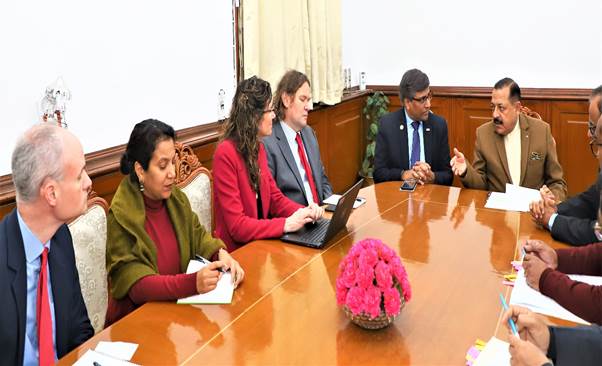A high level US delegation of the premier National Science Foundation (NSF) today called on Union Minister of State (Independent Charge) Science & Technology; Minister of State (Independent Charge) Earth Sciences; MoS PMO, Personnel, Public Grievances, Pensions, Atomic Energy and Space, Dr Jitendra Singh discussed and proposed deeper cooperation with India in areas like Artificial Intelligence (AI), Cyber Security , Quantum, Semiconductor, Clean Energy, Advanced Wireless, Biotechnology, Geosciences, Astrophysics and Defence.
Head of the US delegation, Dr. Sethuraman Panchanathan, Director, National Science Foundation of United States promised the Minister to carry this collaboration to the next level. He was happy to note that this is his third meeting with the Union Minister for Science and Technology in the last six months and that points to the seriousness of the approach.
Dr Jitendra Singh told the Us Delegation that Prime Minister Naremndra Modi in the last 8 and half years took personal interest in Science, Technology and Innovation and tried pro-actively to implement social sector schemes through science based solutions to bring Ease of Living for Common Man. The Minister said, the patronage received from Modi has opened new opportunities and possibilities in all areas of Scientific Endeavors, but more so in areas of Space, Biotech, Geospatial and Sustainable Start-ups. He pointed out that since 2014, in every Independence Day speech, PM Modi has flagged key scientific challenges and projects like Cleanliness, Hydrogen Mission, Digital Health Care system, Deep Ocean Mission, Clean Energy and Start-ups.

Dr Jitendra Singh said, these are the best of the times for both India and America to forge a durable and strong bond for global leadership in fighting global challenges. He said, there is much of ease in the relationships and a clear sign of willingness and optimism to achieve the desirable goals. The Minister hoped that the US will come to the aid of its natural ally (the oldest and largest democracies of the world) when it comes for technology transfer in critical areas, as there is no other option but to collaborate.
During the delegation level talks, Dr Jitendra Singh said, both the sides have already identified the sectors and collaboration is on in areas like healthcare, technology, Space, earth and ocean science and emerging technologies. The Minister underlined that India and the United States have a long-standing connection and shared interest when it comes to scientific discovery and technological innovations and time has come to strengthen and leverage these connects for larger global good.
Dr. Sethuraman Panchanathan assured Dr Jitendra Singh that the subjects identified earlier as well as brought to the fore in today’s meeting would be taken to logical conclusion. He also promised to open new avenues of cooperation in areas like Critical Minerals, Smart Agriculture, Bio-Economy and 6G technologies. He conveyed to the Minister that more joint calls would be taken from March, 2023 on identified projects.
Dr Jitendra Singh told the NSF delegation that the Indian Scientific diaspora is one of the world’s largest and powerful diaspora communities in shaping global discourse, particularly in the technological innovation landscape. He said, both the countries must explore avenues for the US and India to jointly identify, nurture, and promote deep-tech start-ups in areas of mutual interest.

Dr Jitendra Singh also sought the support of NSF for the proposed Integrated Data System. He said, data collection at present is being done by various institutions in different ways, but the Integrated Data System will go a long way in data analytics and associated benefits. The Minister said, the knowledge partnership with NSF-National Centre for Science and Engineering Statistics will be of great value addition in terms of long-term capacity development in this area.
Dr Jitendra Singh also called for scaling up the cooperation in the Space sector and mainly in emerging areas like management of space debris. He also recalled that the NASA-ISRO Synthetic Aperture Radar satellite is expected to be launched in 2023. The Minister said, Science and technology education partnership has been another dimension of the outreach—to establish linkages between American and Indian institutions and students. Education Roundtable held last year with participation of a number of STEM-focused universities.
Prof. Ajay Kumar Sood, Principal Scientific Adviser (PSA) to the Government of India, Dr. S. Chandrasekhar, Secretary, Ministry of Science and Technology, Shri Satyajit Mohanty, Joint Secretary, National Security Council Secretariat and other senior officials of all the six S&T departments and joined the meeting.


Comments are closed.